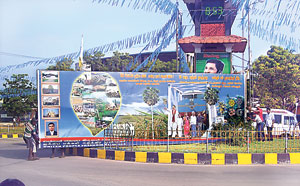Economics, in all its forms, is at the end about costs and benefits. In order to understand how the costs are minimized and benefits are maximized in all forms of economic activity, a country should have clearly defined and enforced property rights.
When each person tries to act upon this economic principle by being innovative and creative, they all contribute to national wealth enabling the country to become rich. But in the countries where property rights are poorly defined and poorly enforced, the one who derives the benefits does not necessarily bear the costs. This is injustice, but no compensation for the victims because it is, though clearly visible, difficult to prove with the support of law. The wealth creation is, therefore, weaker and, economic progress is slower.

Common property belongs to the government or any other central authority. But when the law enforcement is weaker, public properties are used for private gains. Picture shows workers taking down a poster on display. |
Social cost is the cost to others or to the society as a whole arising from private activities. Every activity may have a social cost in varying degrees. However, when the property rights are poorly defined and enforced, social cost becomes greater because the individuals who pass the cost to the others have a greater ability to do so.
My Properties and Others’ Properties
People treat their own property more carefully than they treat property owned by others, owned by everybody or owned by nobody. This is why, among many other examples that we often observe around us, particularly during election times many politicians paste their posters on the walls not owned by them. They do not bear the full cost of this activity, while part of it is passed onto the others, to the society and even to the future generations. Politicians (or their supporters) bear the private cost of pasting posters which includes the costs of printing, gluing, transport and, the workers hired for the activity. They do not bear the ‘social cost’ of this activity in terms of the cost of environmental damage and the cost of removing and cleaning the walls.
These days with election fever in many places in Colombo and in other cities of the country, people could see the iron poles with colour flags representing politicians or their parties along the pavements. How the workers fix these iron poles on the pavements, made of concrete blocks, is interesting to observe. With manual or electric iron driller, they dig a hole in the middle of four-blocks, breaking all of them around the hole! Who bears the cost of the damaged-pavement is not a matter of concern, because it is coming under the ‘social cost’ and, not as part of the private cost of the activity. Given our political culture, politicians have to compete among themselves to care about the public saying ‘I give you more than what the other one promised’.
Sometimes these free handouts can be disguised under economic activities too, reducing the private cost of people’s economic activities as well. However, someone has to bear the cost of all kinds of free handouts since, as we say in economics, “there is no free lunch in the world”. It is also not the fault of the politicians who have learnt from our political history, because they have to respond to the demand from the civil society.
Ownership and User Right
Property right is a legal entitlement which has two aspects; first there should be a legal ownership and, secondly the owner should have the right to use it at his/her own will. Both are essential components of property rights because sometimes, there is “ownership without user right or user right without ownership”, affecting wealth creation. The problem often arises when the property rights are not defined clearly by the legal system and, when the legal system is weak in enforcing the rule of law ensuring property rights.
Properties are three types, according to their ownership: private property, common property and, nobody’s property. Even though property rights are clearly defined and strongly enforced, if the owner’s action affects the others (creating social cost) law enforcement can prevent it. This is why in many developed countries where property rights are clearly defined and enforced, even the owner cannot make alterations to the property or start business activity in an ad hoc manner. The person will be either prevented by doing so or charged for costs to others. This is not against the concept of economic freedom as, all proponents of economic freedom agree with the fact that ‘someone’s freedom should not limit that of another’.
Basically common property belongs to the government or any other central authority. But when the law enforcement is weaker, public properties are used for private gains. This is why the politicians as well as the people make use of the public property for private gains such as putting up houses for residential purpose, carrying out private business activities and, parking their vehicles or dumping garbage using the public places, roads, railways and government reservations.
Under the rules and regulations even in Sri Lanka, people cannot get access to water supply, electricity or any other public utility and, even a postal address for the places as such, interestingly they all have got access to them.
It shows that poorly defined and enforced property rights also lead to increased corruption as well. But the enormous social costs emanating from this property right problem has rarely been estimated and compensated. People naturally follow the leaders who failed to establish clear property rights and to abide by the rule of law.
(For comments on this article, the writer could be reached at sirimal@cmb.ac.lk). |


